Rachel Held Evans's Blog, page 22
May 9, 2014
Stoic Doesn't Mean Spirit-Less (by Michelle DeRusha)
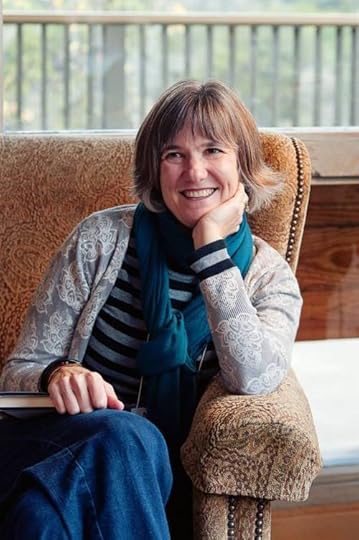
Today's post comes to us from the talented and delightful Michelle DeRusha, who is a longtime participant in our little online community.
A Massachusetts native, Michelle moved to Nebraska in 2001, where she discovered the Great Plains, grasshoppers the size of Cornish hens … and God. Michelle writes about finding and keeping faith in the everyday at michellederusha.com, as well as for the Lincoln Journal Star and The High Calling. She’s mom to two bug-loving boys, Noah and Rowan, and is married to Brad, an English professor who reads Moby Dick for fun.
Her first book, Spiritual Misfit: A Memoir of Uneasy Faith , is excellent, and was published in April by Convergent Books. I highly recommend it, especially for those who love the spiritual memoir genre.
Enjoy!
***
“So how did you go from Pentecostal to Lutheran?” I lobbed the question at James one evening as our small group members sat in a circle around my living room. James nodded toward his wife, who was tucked next to him on the couch, Bible open on her lap. “I married her,” he said, and the whole group laughed because we all knew, sometimes that’s exactly how such a journey unfolds.
“But to tell you the truth,” he said, leaning forward and resting his forearms on his knees, “I miss the intensity of my old church. It’s different there; you feel an energy, an aliveness. You really feel the Spirit’s presence.”
The rest of us nodded, intrigued. Most of us in our small group are long-time or even lifelong Lutherans; we don’t have much experience in the Pentecostal church.
James settled back into his chair, paused a moment, and then suddenly leaned forward again, looking me straight in the eye. “I don’t know,” he said. “I just think if you’re not getting off the pew and on your feet, if you’re not physically in the moment, you’re not truly experiencing the Holy Spirit.”
I know James didn’t intend his comment to be inflammatory or judgmental; he didn’t intend to start down the “my religion versus your religion” road. In fact, the moment I cleared my throat, planted my feet on the floor and leaned forward in my chair to object to his statement, James immediately backpedaled. He undoubtedly realized he’d crossed the line in a living room full of stoic, Midwestern Lutherans whose idea of exuberant worship is timidly repeating, “He is risen indeed!” once a year on Easter Sunday.
Yet I also suspect James is not alone in his thoughts on the Holy Spirit. Somewhere along the line it seems our understanding of where and how the Holy Spirit is accessible has become synonymous with a certain brand of worship – expressive, demonstrative, emotional and physical. We’ve focused exclusively on the wind and fire and tongue-speaking of Pentecost and dismissed the still, small voice Elijah heard in the cave on Mount Sinai. We’ve deemed one experience powerful and authentic and the other less-than.
It was clear from the way James lit up when he talked about his former church that he prefers a more emotionally expressive, physical worship experience to the formal, liturgical format of the Lutheran service. He comes alive and is energized by Pentecostal worship; it’s where he most often meets and experiences God. James likes to be on his feet, voice raised, arms uplifted, surrounded by the cacophony of tongues. I get that, and I don’t have a problem with it. My defensiveness was sparked not by James’ personal preference, but by his suggestion that my preferred worship style is less Spirit-filled and a less authentic way to experience God.
The temptation to privilege a physical, demonstrative faith is understandable. If we can create a script for belief, we can measure adherence to or deviation from it. Perhaps that's why we spend so much time fixated on the physical motes in the eyes of others (sexual sin, for example) and neglect the spiritual logs – like pride and hypocrisy – in our own.
The fact is, what James perceived as a lack of the Holy Spirit is simply a difference in worship personality. James is praise band, wind and fire and tongues. I’m old-school hymnal, contemplation and still, small voice. James would thrive at a 10,000-person worship service in a stadium; I’d prefer a Benedictine monastery with twelve monks in brown robes. Our preferences couldn’t be more different, but neither is wrong, and neither is more Spirit-filled than the other.
I think sometimes we Christians allow our passion to cloud our perception. We conflate what’s best for us personally, as individuals, with what’s best for everyone else. So enamored are we with our own brand of worship and our own denomination, we are blind to the beauty and uniqueness of those that differ. So passionate are we about our own personal experiences with the living God, we fail to understand that others experience the Spirit in wildly different ways – experiences that may not look and sound like ours, but are no less God-filled and good.
***
Be sure to check out Michelle's beautiful book, Spiritual Misfit: A Memoir of Uneasy Faith.



May 8, 2014
Ask a pastor’s wife and a pastor’s husband…
Our “Ask a…” series is back! And today we return with an installment I’ve been looking forward to for some time: Ask a pastor's wife and a pastor's husband.
The image of the pastor’s wife has long been entangled with stereotypes involving baking, singing, and piano-playing, but in reality, spouses of clergy--both men and women--are as diverse as any other members of the Body.
So I thought we might benefit from “Ask a pastor’s wife…” and “Ask a pastor’s husband…” to learn how we church folk can love our pastors and their families better.
Our guests:
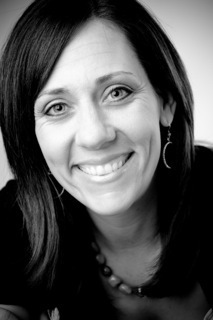
Jodie Howerton is a freelance writer and communications consultant who has been married to her pastor husband, Mike, for 18 years. She has 3 children and is the founder of the Redefine Positive Project, an initiative that is working to reform HIV/AIDS education in public schools across the nation.
(I’m a huge fan of Jodie’s work. When I asked if she’d be interested in participating in this, she agreed enthusiastically, but added, “I should let you know that I’m not a very traditional pastor’s wife." I told her that’s exactly why I asked her!)
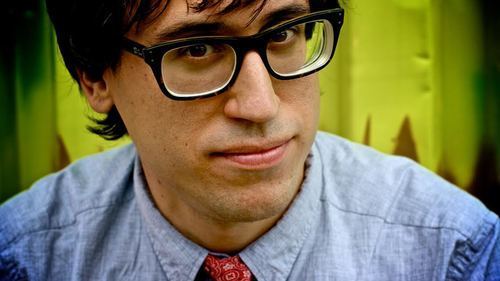
Jim Kast-Keat is married to Jes, the Associate Minister at West End Collegiate Church in New York City. (You may remember we featured Jes in "Ask a Reformed pastor...") Along with being a pastor's husband, Jim is also a pastor, serving as the Associate Minister for Education at Middle Collegiate Church in the East Village. He is a divergent thinker, an ideation specialist, and an aspiring minimalist. Prior to working at Middle he helped lead ikonNYC in New York, NY, worked as a Product Designer with Sparkhouse in Minneapolis, MN and was a pastor at Mars Hill Bible Church in Grand Rapids, MI. He is the creator and curator of ThirtySecondsOrLess.net. To find out more about Jim go to www.jimkastkeat.com or follow him on twitter.
You know the drill. If you have a question for Jodie or Jim, leave it in the comment section. (Please specify the person to whom your question is directed.) At the end of the day, I’ll pick the top 6-7 questions and send them to Jim and Jodie. Use the “like” feature to vote on your favorite questions from other readers. Jodie and Jim's responses will be featured on the blog in the next few weeks.
Check out the rest of our "Ask a..." series here.
I'm interested to see where this one goes! Ask away!



May 6, 2014
On Faithfulness (A Brain Dump)
I’m still not over the World Vision thing.
I’m not over 10,000 children losing their sponsorships in a protest against gay marriage. Not even close.
When news of World Vision’s decision to reverse the new policy reached me, I was on the road and just minutes away from speaking for something like the 30th time in three months. I was as tired as I’ve ever been in my life—physically, emotionally, spiritually, and creatively. I slept for a total of one hour that night, before getting up the next morning and flying to Houston, Texas to speak yet again.
I remember thinking, “How can I justify speaking in a church when today I’m not sure I believe in God? How am I supposed to carry on this work when I’m not sure I can be part of the culture anymore?”
And in the middle of all that doubt and pain and exhaustion, right when I felt most vulnerable, Christians delivered some swift and focused kicks to my gut. I was publicly mocked and shamed. People called me a heretic and bid me farewell. They took to Twitter to make fun of my appearance and belittle my husband. They called me a “wolf in sheep’s clothing,” “unstable,” and “anti-Christ.”
This wasn’t about me—I knew that—but still, it hurt. At times I wanted nothing more than to hightail it out of this whole “industry” we call Christianity….which is exactly what many of them want.
But at the same time, Christians called. Christians sent flowers. Christians sponsored kids. Christians—conservative and liberal, evangelical and otherwise— offered to help. Christians sent notes of encouragement. Christians prayed with me and cried with me and cussed with me. Christians apologized. Christians loved. Christians provided wine. Christians who had a lot more invested in this than I confounded me with their capacity to forgive and their commitment to radical, unexplainable grace.
They loved in ways I couldn’t ignore, ways that unclenched my fists and cracked my armor.
And so I stood, vulnerable once again, in that most infuriating and miraculous contradiction of the Christian life: that the Church wounds and the Church heals.
I’m still not sure what to do with that.
***
How do I hate the term “celebrity Christian?” Let me count the ways!
I hate that it reflects a culture that idolizes success.
I hate that it exposes my own dark desires and unhealthy fixations.
I hate that once someone decides you’re a “celebrity Christian,” they use that as an excuse to treat you as something other than a human being.
I hate that I’ve used it as an excuse to do the same.
I hate that it comes with the pressure to speak more definitively (even when you’re not sure) and lead more decisively (even when you have no idea where you’re going).
I hate that it reduces people to “fans” or “haters” when God only gave us neighbors.
I don't want to live in a world of fans and haters.
***
At the Festival of Faith and Writing I got “enneagramed” by my friend Leigh Kramer who confirmed my suspicion that I’m a solid 3 on the chart, meaning, basically, I have the type of personality that has to WIN ALL THE THINGS. (If you’ve read Faith Unraveled, you know this goes all the way back to The Best Christian Attitude Award…which I fought like hell to win four times in a row.)
When I’m healthy, I take my ambition and drive and channel it into being creative, getting stuff done, helping other people, and working on the projects and causes I care most about. When I’m unhealthy, I get fixated on image, approval, and pounding "the competition" into the dirt in ongoing quest to WIN ALL THE THINGS.
This affects my activism so that, if I’m not careful, I make it less about partnering with people and more about beating people. I make it less about making a good argument and more about proving myself to the skeptics for the sake of improving my status.
And so, whenever I used my writing to advocate for things like gender equality in the Church, acceptance of LGBT people, ending systemic abuse, creating space for questions and doubts, etc., I found myself asking, what does winning look like?, when what I should have been asking , is, what does faithfulness look like?
Faithfulness to Christ.
Faithfulness to Scripture.
Faithfulness to myself.
Faithfulness to my family and community.
Faithfulness to my work and calling.
Faithfulness to you, my readers.
Faithfulness to the people whose stories shape the content of this space.
What I’ve realized over these past few weeks is that God didn’t call us to win, God called us to be faithful. God doesn't call us to change the world, God calls us to serve the world.
(This doesn't mean you don't make the argument or address a destructive idea. You do. But you do it for the sake of liberation and healing, not for the sake of putting people in their place.)
So the next time someone asks me about the future of evangelical Christianity or whether I belong in that “camp,” or who’s got the upper-hand, I’m just going to tell them the truth: hell if I know.
I can’t see the big picture right now. I’m not interested in being prophetic or reading trends or figuring it all out.
All I can see is the next word, the next post, the next prayer, the next Sunday, the next bit of wafer and wine, the next story, the next need, the next comment, the next baby bird to jump out of that nest in our carport, the next nudge of the Spirit, the next puzzle, the next question, the next random thing that nettles my brain and screams WRITE!
My job is to be faithful to that. No more, no less.
And there’s no other way to take it but a day at a time.
***
I suspect I’m not the only one who forgets that the assignment is faithfulness—not winning, not fixing, not changing other people, not changing the world.
What’s the idol that distracts you from faithfulness?
***
Special thanks to Mom & Dad, Dan, Brian McLaren, Shauna Niequist, Ann Voskamp, Mary Kassian, Sarah Bessey, Kristen Howerton, Glennon Melton, Jen Hatmaker, Jamie Wright, Tara Livesay, South Main Baptist Church in Houston, Chris & Tiffany Hoose, and so many others for providing the aforementioned prayers, support, flowers, advice, and booze.
***
Note: Since several of you mentioned it, I'm cutting back on speaking. Taking the summer off and then moving to a pace of one trip per month.



May 5, 2014
Should Jesus inform our Christianity? (A Response to Sarah Palin, Al Mohler, & Me)

The myth of redemptive violence—the notion that we can kill our way to peace— is a powerful one, and I'm constantly amazed at how it sneaks into our culture, the Church, and even my own heart.
We saw it stated rather overtly when Sarah Palin, a Christian, declared to a roaring crowd at the National Rifle Association annual meeting that true leaders “put the fear of God in our enemies,” and that if she were in charge, those enemies would know “that waterboarding is how we baptize terrorists."
The myth was perpetuated again last week by President of Southern Baptist Theological Seminary Al Mohler who, in response to Clayton Lockett’s botched execution in Oklahoma, wrote a post for CNN entitled “Why Christians should support the death penalty.”
“In a world of violence,” he argues, “the death penalty is understood as a necessary firewall against the spread of further deadly violence.”
Violence to stop violence to stop violence to stop violence.
And on and on it goes...
I found it telling that in making his case for the Christian view on capital punishment, Mohler does not once consider the teachings of Jesus Christ. Instead, he supports his position by primarily citing Old Testament law, which he neglects to mention prescribes the death penalty not only for murderers, but also for adulterers and disobedient children.
And it is ironic that Mohler, who has been a tireless advocate for young earth creationism on the basis that “the straightforward and direct reading of [Genesis] describes seven 24-hour days,” does not seem to think that a straightforward and direct reading of Jesus’ teachings regarding violence is necessary.
In his famous Sermon on the Mount, Jesus confronted the myth of redemptive violence head-on:
You have heard that it was said, ‘Eye for eye, and tooth for tooth.’ But I tell you, do not resist an evil person. If anyone slaps you on the right cheek, turn to them the other cheek also. And if anyone wants to sue you and take your shirt, hand over your coat as well. If anyone forces you to go one mile, go with them two miles. Give to the one who asks you, and do not turn away from the one who wants to borrow from you. You have heard that it was said, ‘Love your neighbor and hate your enemy.’ But I tell you, love your enemies and pray for those who persecute you, that you may be children of your Father in heaven.”
And when Jesus was given the opportunity to participate in the execution of an adulterer, he refused, challenging those who had gathered around the woman to drop their stones and walk away.
Funny how it’s easy to favor a “straightforward reading” of the text until the text says “love your enemies.”
Since he’s a brother in Christ, I’ll give Mohler the benefit of the doubt and assume he didn’t quote Jesus because he believes Jesus’ teachings regarding violence are intended to be applied exclusively at the personal level without affecting public policy. (While Old Testament law still applies?) He’s entitled to that opinion, of course, but I do wish he would stop accusing Christians who don’t interpret Genesis 1 as a literal, scientific text as having a “low view of Scripture” when his piece reveals that his own literalism is as selective as the next guy’s.
(Reality check: We’re all selective about what we interpret and apply literally from Scripture. And most of us are doing our best to honor the meaning of the biblical text while also considering its original context, culture, genre, and language. Disagreements don’t have to reflect a high view vs. a low view. Most simply reflect different views.)
Still, when we have folks declaring that support for torture and the death penalty reflect the Christian position on justice, I think it’s worth asking a seemingly obvious question: To what degree does Jesus inform our Christianity?
A recent Barna poll showed that only 10 percent of practicing Christians in America believe Jesus would support the death penalty for criminals. And yet a much higher percentage (42 percent of Christian Baby Boomers and 32 percent of Christian millennials) support the death penalty themselves.
That’s a pretty significant disconnect.
And I suspect it exists because we have created a culture in which Christians tend to see Jesus as a sort of static mechanism by which salvation is secured rather than the full embodiment of God’s will for the world whose life and teachings we are called to emulate and follow.
Basically, we believe that Jesus died to save us from our sins, but we haven’t yet embraced the reality that Jesus also lived to save us from our sins.
We haven’t embraced the reality that following the ways of Jesus leads to liberation and life more abundant - not only for ourselves but also for the whole world.
Instead, we tend to think of the Sermon on the Mount and the stories of the gospels as interesting backstory to Jesus’ march to the cross, where the penalty for our sins was paid in full. We flatten out the words of God-In-Flesh—(God eating and drinking and walking and teaching and laughing and crying among us)— and give them equal (or often lesser) value to those of the apostle Paul or Old Testament law.
But the Bible isn’t flat. The Bible reaches its culmination, indeed its fulfillment, in the person of Jesus Christ. So it seems like we ought to listen to what he had to say….and what he’s saying still.
But here’s the rub:
It’s easy for me to spot Al Mohler’s Sarah Palin’s inconsistent application of Jesus’ teachings, but the minute I turned to the Sermon on Mount to load up with proof texts against them, I was hit by this zinger:
“You have heard that it was said to the people long ago, ‘You shall not murder,and anyone who murders will be subject to judgment.’ But I tell you that anyone who is angry with a brother or sister will be subject to judgment. Again, anyone who says to a brother or sister, ‘Raca,’is answerable to the court. And anyone who says, ‘You fool!’ will be in danger of the fire of hell."
That word, ‘raca,’ basically means “idiot,” and when I think of all the times I’ve muttered that word under my breath in response to folks with whom I disagree, it’s a little convicting.
….Okay, a lot convicting.
(Seriously. Every time I go to the Gospels to mine them for a theological point to use in an argument, I end up walking away saying, "Dang it, Jesus! WHY!?!?")
The truth is, Jesus doesn’t always inform my Christianity either. In fact, sometimes I’m not sure I want to follow Jesus. I'm not sure it’s possible to be a healthy, well-adjusted person and go around loving your enemies and giving without expecting anything in return and turning the other cheek. For all my well-intentioned advocacy against the death penalty, I'm not certain I'd oppose it if the person on death row had killed my mother or my sister or my husband.
But if Jesus is really God-in-flesh, if he really shows us the way to live, then I need the Church to help me figure out what it looks like to do that faithfully. I need the Church to help me wrestle with these teachings, not ignore them.
And I think that begins by putting Jesus at the center, not the periphery, of what it means to be a Christian.
(See also, "Everyone's a biblical literalist until you bring up gluttony." And check out Zack Hunt's post on this as well. And also Jonathan Merritt at The Atlantic with "Would Jesus Support the Death Penalty?")



May 4, 2014
Sunday Superlatives 5/4/14

With my speaking schedule slowing down and my next book almost finished, I’ll finally be back to regular blogging over the next few weeks, and I can’t wait. After some reflection and re-prioritizing, I feel like I have a better sense of what I’m called and gifted to do online and with this community. Thank you so much for giving me the space to breathe and think a little more deeply about that. I’m so grateful.
Around the Web…
Funniest:
The Honest Toddler with “Open Letter to the Child I Hit at the Park”
“And then I saw you. Blue and white pinstripe overalls. Like a convict. Your ensemble was fittingly poetic. Foreshadowing, brought to you by Carters. You sat, legs splayed in the sandbox holding my shovel.”
Wisest:
Heather Kopp with “The Promise of Shared Brokenness”
“The particular brand of love and loyalty that seemed to flow so easily here [in recovery meetings] wasn’t like anything I’d ever experienced, inside or outside of church. But how could this be? How could a bunch of addicts and alcoholics manage to succeed at creating the kind of intimate fellowship so many of my Christian groups had tried to achieve and failed? Many months would pass before I understood that people bond more deeply over shared brokenness than they do over shared beliefs.”
Bravest:
Emily Maynard with “God Has a Body”
“God has a body, they said. God walked on the earth and blew dust out of his nose and laughed with his friends. God took on human flesh so we, human flesh, could be with God. God had to become a body, they said. And I believed it. I saw the pictures, growing up; I saw the pictures of God on flannel graphs and coloring pages and in the Jesus storybooks and on TV. I liked God. God had a body, but it wasn’t a body like mine. It wasn’t a body with breasts that grew, with hips that expanded, with a uterus that bled regularly, with cramps that made him throw up every month. It wasn’t a body that was warned against, and called a stumbling block.”
Sweetest:
This new song/video from Jasmine Thompson
Best Analysis:
Jared Keller at Pacific Standard with “No, the Internet is Not Killing Religion in America”
“The Internet is just another tool, not some aggregated monster-like state that graced the front of Thomas Hobbes’ Leviathan, crushing churches across the English countryside. It doesn’t make you do anything: It amplifies your best and worst traits, all of which are shaped by your childhood, your socioeconomic status, and your education level, among other things.”
Best List:
Heart & Minds with “9 Books on Sustainable Living, Good Eating, Local Churches, and Living Gently on the Land”
Best Story:
Cheryl M. Lawrence with “A Good Death”
“We asked ourselves: What would it mean for a church to lose its life for the sake of the gospel? What would it mean for a whole church to take up a cross and follow our crucified Savior?”
Best Sermon:
David Henson with “The Hope in Our Wounds”
“Ours is a faith that embraces wounds. It’s not that it celebrates pain or relishes in it. Nor does our faith ask us to seek out pain or suffering, as if our redemption is tied up with how miserable we can be for Christ. But our faith refuses to gloss over our woundedness with hollow positive thinking. It refuses to ignore that basic tenet of human life. We will hurt.”
Best Response:
Lisa Sharon Harper with “Donald Sterling: Façade, Fiction, and Forgiveness”
“The fictitious narrative is this: People of color are either beasts or burden, only able to survive because of the benevolent charity of the whites who feed them, house them, and give them "things to do." These are the facts, hidden by the façade and the fiction: For every one Magic Johnson, Oprah Winfrey, Barack Obama, or Eva Longoria, there are millions of blacks, Latinos, and others who have been barred from adequate housing, equal education, and affordable health care. They have suffered the effects of legislation that lowered the bar of criminality and targeted them to fill privatized prisons. Sterling's alleged comments are only a drop in the bucket. They only revealed the heresy, the connection between the façade, the fiction, and the facts.”
Best Infographic:
Nielsen TOPTEN with “Just How Long is a TV Marathon?”
Best Dialog:
Justin Lee and Ron Belgau at Seattle Pacific University with “Two Views on Christian Sexual Morality”
Best Conversation-Starter:
Sharon Hodde Miller with “My Kid is Not My Calling”
“So, let's stop throwing around "calling" when we really mean "life stage" or "career." It's not that calling cannot align with these things, but if we carelessly slap "calling" on any and every circumstance, we risk overlooking the unique purposes written into our beings. Christians' use of the word "calling" might be arbitrary, but God's call is anything but. Not all of us are called to motherhood, but all of us are called to something.”
Best Reflection:
Brené Brown and Work of the People with “Jesus Wept”
“I thought faith would say, I’ll take away the pain and discomfort, but what it ended up saying was, I’ll sit with you in it.”
Most Heartbreaking:
“After Two Weeks, 234 Abducted Nigerian Schoolgirls Are Still Missing”
Most Pastoral:
Josh Graves at Jesus Creed with “The Place in the Soul for Doubt”
“My point is to simply say that when you, the preacher or bishop or small group leader, find yourself in that moment in which someone bares their doubtful soul, recognize the sacredness of what’s happening in your very midst. You’ve been invited into one of the most important parts of a person’s soul. A place in the soul that is deeper than education, family bonds, 401k trends, and exclusive summer travel plans. You are wading in the deepest mystery of what gifts a person to choose or not choose the path of faith.”
Most Helpful:
Gail Wallace at The Junia Project with “1 Timothy 2:12: Ten Talking Points”
“If we really want people to reconsider their position on this ‘proof text bomb’ let’s figure out how to have this discussion in a more meaningful way.”
Most Powerful:
Austin Channing Brown with “The Impossible”
“I believe in the death of injustice, in the life of hope, grace, mercy, and love. I believe in the impossible. I believe there can be healing where there is violence. I believe reconciliation is possible- hearts can be moved, minds can be changed, politics broken. I believe that justice can roll down like a river and we can all taste its sweetness. I believe in the impossible. I believe we can treat people- all people- with dignity; we can recognize their humanity; recognize the divine within. I believe we can do more. Create more jobs. Build more homes. Turn food deserts into promiseland harvests. Subvert racial and gender hierarchies. Consider others more important than ourselves. Slay preferences that lead to exclusion. Set captives free. Welcome the stranger. I believe in impossible things. I believe in death because I believe in life. I believe in the death of -isms. I believe in the life of love. I believe humanity can change because I believe in the impossible.”
Most Encouraging:
Ann Voskamp with “Why Your Soul Needs You To Make Time to be Creative: 7 Keys”
“Creativity, it’s good theology; it’s what God did in the beginning.”
Most Thoughtful:
James Hoskins at Christ and Pop Culture with “God is Not Dead and the Angry Professor: That Was Not My Experience”
“…Not once did my philosophy professors attack my faith or treat me unfairly. In fact, I found all of them to be extremely kind, patient, and generous. Several of them, including the Nietzsche expert, wrote me glowing letters of recommendation for grad school that, I’m certain, included compliments I didn’t fully deserve. I felt respected, even mentored, by them. And all of this despite the fact that they passionately disagreed with my beliefs. That’s not to say they never challenged my faith. They did. But it was for a really good reason: it was their job.”
Most Relatable:
Benjamin Moberg with “Hymnals and the Way of Faith”
“…Maybe it’s not about fitting back into something. Maybe it’s about being aware of the new shape of my faith. I’ve grown and changed and it’s different now, maybe better. In this season, I can’t hear the electric zest of an era that is still too raw, that left me high and dry and bitter and cold. Maybe I can only be with the old songs. The simple ones. I can lean into the sturdiness of lyrics long-lived.”
Most Enlightening:
Ebony Adedayo with “Break Every Chain: The Music I Hear on the Radio”
On my nightstand…“…The message that they keep sending is that the Christian experience doesn’t belong to someone who looks like me. It reinforces the sad reality that black artists, preachers, teachers, pastors, etc, will hardly ever be able to use their voice in the ‘mainstream’ Christian arena in the U.S. without being silenced, marginalized or exploited.”
Something Other Than God by Jennifer Fulwiler
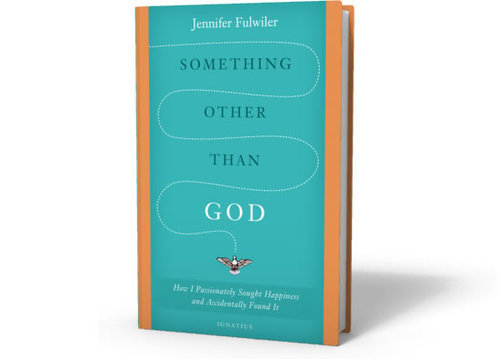
Sermon on the Mount (Story of God Commentary) by Scot McKnight and Tremper Longman III
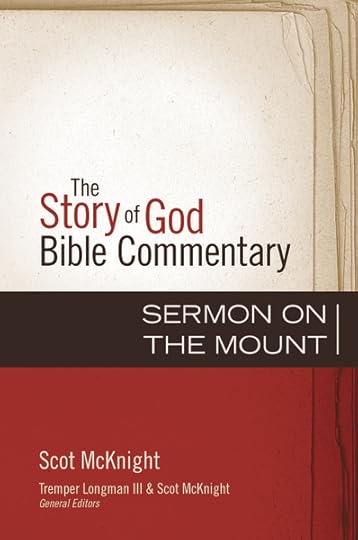
So, what caught your eye online this week? What’s happening on your blog?
Read any good books lately?



May 1, 2014
The Best Faith Film You’ll See All Year
Amidst all the hype and debate surrounding this year’s flood of faith-related films--Noah, God is Not Dead, and Heaven is For Real--a quiet Oscar winner from 2013, recently released to DVD, provides the most compelling story of faith I’ve seen on the big screen in years.
(Well, technically I saw it on the little screen on Delta Flight 1768 from Seattle to Atlanta, which is pretty much the only way I see any movies these days…but, hey, at least the cookies and pretzels are free.)
Philomena traces the heart-wrenching journey of a devout Irish woman (played by the incomparable Judi Dench) who sets out to find her long lost son, whom she was forced to give up for adoption as a teenager by nuns who kept her like a prisoner in a convent full of other unwed mothers in the 1950s.
Her unlikely partner in this venture is a washed-up journalist named Martin Sixsmith (played brilliantly by British comic actor Steve Coogan) who somewhat reluctantly finds himself chronicling this “human interest story.”
The film is based on a true story as detailed in Sixsmith’s book, The Lost Child of Philomena Lee, and is at once laugh-out-loud funny and excruciatingly sad. (The downside to watching a great movie on a plane? Crying in front of your seatmate.)
The dialog is smart and playful, the tone pitch perfect, the acting superb. Dench totally nails her role as the provincial, inexperienced Philomena, who annoys the skeptical Martin with her old-fashioned sensibilities and penchant for lowbrow romance novels. The dialog between the two alternates between hilarious and profound, and their relationship totally makes the film. (In one scene, Philomena asks Martin if he believes in God, and in response, he delivers a lengthy, anxious soliloquy about the impossibility of answering that question and the arrogance of certainty in the face of the unknown. When he asks Philomena the same question, she simply responds. “Yes.”)
But neither character is portrayed one-dimensionally. Both are imperfect, sympathetic, complicated, and surprising.
Unlike God Is Not Dead, where the atheist professor is portrayed as blindly antagonistic toward people of faith, Martin’s frustrations with religion are reasonable and relatable, especially given the circumstances, and I found myself nodding along as he urged Philomena to confront the evil done to her by the Church.
“I don’t like that word, evil,” responds Philomena.
“No, evil’s good,” he assures her, “story-wise.”
Yet time and again, Philomena confounds both Martin and the audience with a faith that is at once understated and brave, quiet and profound. In the end, the two come together in a powerful moment in which Martin, though he is justifiably angry and fed up with the abuses of the convent that betrayed Philomena, nevertheless purchases a gift for her from their gift shop, to be presented with love at one of her most vulnerable moments.
It’s unusual to find a movie in which one relates so powerfully to both the person of unshakable faith and the skeptic. But with Philomena, I did. What I loved most about this movie was the way it so honestly and carefully explored the tension of holding faith in the midst of abuses of that faith. I can’t think of a movie that does this better.
While the debates rage on about whether Noah is biblical enough, Heaven is For Real true enough, and God is Not Dead profitable enough, Philomena delivers a quiet, understated, and powerful portrayal of the actual human experience, where clear-cut lines between good and evil, heroes and villains, right and wrong might be good “story-wise” but don’t reflect the reality most people of faith actually live in.
It’s a movie I’ll be thinking about for months, maybe years, long after I descended from 31,000 feet.



April 25, 2014
See you in Seattle!
I’m in Seattle this week, speaking at Seattle First Baptist on Saturday and Sunday. As part of the Romney lecture series on Saturday, I’ll be speaking about millennials and the church as well as spirituality and social media (10 .am. – 12 p.m.). On Sunday, I’ll be speaking at the 11 a.m. worship service. Both events are free and open to the public. (The lunch event on Saturday has been sold out.)
You can learn all the details here.



April 10, 2014
In Grand Rapids, Michigan tonight (Calvin College)
So I’ll be speaking at Calvin College tonight at 7 p.m. in the Chapel about my Year of Biblical Womanhood. The event—(which is connected with the school, not the Festival of Faith and Writing, which is happening concurrently and which I’m also participating in)—is free and open to the public.
Already I’ve been so warmly welcomed by the students here and by some gorgeous weather. They’ve announced the event with sidewalk chalk, so I’ve walked over my name like four times today. I love college campuses!
Would love to connect with you in person, so if you come, be sure to say hello.



April 9, 2014
Holy Week with The Liturgists
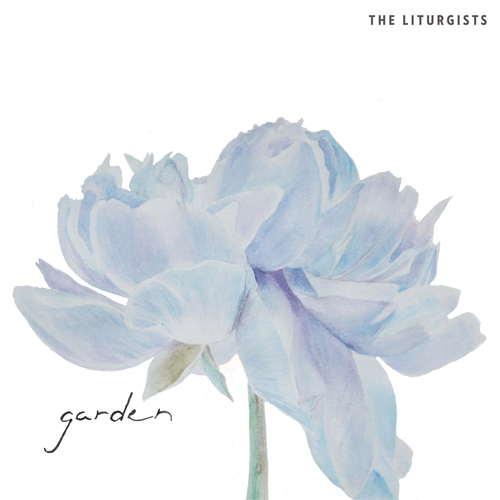
As Lent draws to a close and Holy Week approaches, I wanted to let you know about a cool project I had the pleasure of working on with Michael and Lisa Gungor, Rob Bell, Amena Brown, Aaron Purdy, Mike McHargue and other creative types collectively known as The Liturgists.
This week, The Liturgists released ‘Garden’—which combines music, prayer, poetry, and spoken word to create an honest and evocative liturgy around Good Friday, Holy Saturday, and Easter Sunday. For my part—Holy Saturday—I adapted and read a post entitled “Holy Week for Doubters.” (But be sure to listen to each entry. You will love "Friday" and "We Believe"...and well all of it.)
As I look ahead to what’s next in life, this is just the sort of work I hope to do more often. And I hope you, your family, and perhaps your faith community resonate with ‘Garden.’
You can listen here.



April 8, 2014
Monkey Gets a Makeover: “Faith Unraveled” releases today!
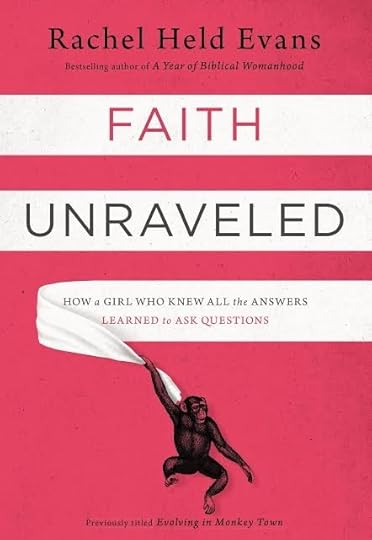
“If I’ve learned anything over the past five years, it’s that doubt is the mechanism by which faith evolves. It helps us cast off false fundamentals so that we can recover what has been lost or embrace what is new. It is a refining fire, a hot flame that keeps our faith alive and moving and bubbling about, where certainty would only freeze it on the spot.” - from Faith Unraveled
When I was a little girl, I vowed to see my first book in print by the age of 10. So when people told me that 27 was too young to write and publish a memoir, I kindly informed them that I was actually running about 17 years late.
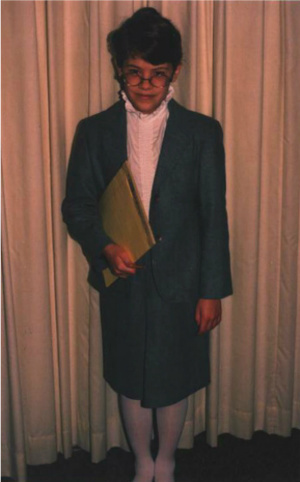
I dressed up as an author for career day in third grade. Had I known the actual "uniform" of the working writer, I would have just worn my pajamas.
It is both sweet and strange to read through the pages of that first book, so carefully and earnestly written. They tell the story of my childhood faith, my life as a young Christian apologist in Dayton, Tennessee (home of the famous Scopes Monkey Trial of 1925), and those first few questions about Christianity that slowly unraveled everything I thought I believed.
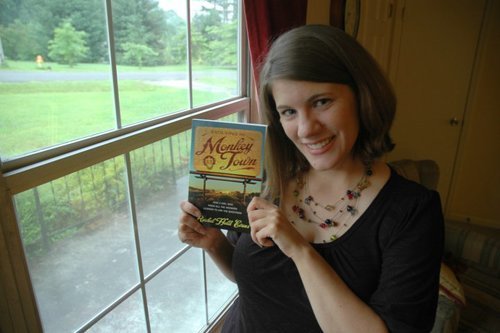
Dan made me do this.
The book, Evolving in Monkey Town, was published by Zondervan in 2010 and became an important avenue through which to connect with other Christians who were struggling with doubts about their faith and wondering where they fit into the church. What a joy it was to receive letters from readers containing those two powerful words: “Me too.”
Evolving in Monkey Town didn’t exactly sell off the shelves—(it’s always a fun surprise when someone brings it to a book signing!)—but it gave me the opportunity to keep writing, which is all I’ve ever wanted to do.
So it brings me great joy to announce today that Evolving in Monkey Town has officially been re-released by Zondervan with a new title and new cover. Faith Unraveled: How a Girl Who Knew All the Answers Learned to Ask the Questions hits the shelves today. (And it's just $3.99 on Kindle/Nook.)
If you know me only through the blog or my second book (A Year of Biblical Womanhood) you will find some surprises in Faith Unraveled, like how I won the Best Christian Attitude Award at my elementary school four years in a row, how I survived the annual Judgment Day House at First Baptist Church in Dayton, how I studied to defend young earth creationism in college, how I travelled to India in search of God, how a woman named Zarmina changed my life. This is a deeply personal book, and it delves into the places, stories, questions, and relationships that most shaped my faith journey. I suspect many of you will find them familiar.
If you’ve already read this one, all that’s changed is the title and cover and a few revisions. But if you’re interested in helping to get the word out, consider sharing a favorite quote on Twitter or Facebook today or leaving an Amazon review. As work continues on Book #3 (due out this fall) and I take a little blogging break, I hope this first book, written with as much love and courage as my 27-year-old self could muster, will do what it was always intended to do: remind you that you’re not alone.
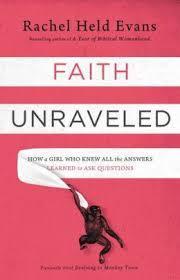
Or check your local bookstore.



Rachel Held Evans's Blog
- Rachel Held Evans's profile
- 1710 followers



